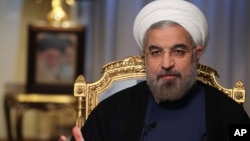DUBAI —
Iran said on Tuesday that President Hassan Rouhani had exchanged letters with U.S. President Barack Obama, confirming a rare contact between leaders of the two nations at loggerheads over Iran's nuclear program, the Syrian war and other issues.
The United States and Iran cut off formal diplomatic ties in 1980, shortly after students and Islamic militants stormed the U.S. Embassy in Tehran and took American diplomats hostage.
But officials from both countries have said they are open to direct talks in order to find a diplomatic solution to a decade-long dispute over Iran's nuclear program, over which the West has imposed economic sanctions on the Islamic Republic.
Tehran denies seeking nuclear weapons but the United States and its allies suspect it is working towards such a capability.
Iranian Foreign Ministry spokeswoman Marzieh Afkham said on Tuesday that Obama had sent Rouhani a message of congratulations on the occasion of his election.
“This letter has been exchanged,” Afkham said, according to the ISNA news agency. “The mechanism for exchanging these letters is through current diplomatic channels.”
Though rare, it is not the first time letters have been exchanged. Rouhani's predecessor, Mahmoud Ahmadinejad, wrote one to Obama three years ago, and Obama wrote twice directly to Supreme Leader Ayatollah Ali Khamenei, in 2009 and 2012.
Obama said in an interview broadcast on Sunday he had exchanged letters with Rouhani. The two men will speak on the same day at the U.N. General Assembly next week, though there are currently no plans for them to meet.
Rouhani, a centrist cleric who defeated more conservative candidates in June elections, has said he wants to pursue “constructive interaction” with the world, raising expectations of a negotiated settlement to the nuclear dispute.
Khamenei, who would have to authorize any nuclear deal, said in a speech on Tuesday that he supported “correct and rational foreign and domestic policies,” according to ISNA.
Iran does not seek nuclear weapons, Khamenei said, adding that the nuclear issue was an excuse by the United States and its allies to confront Iran.
At a U.N. nuclear agency meeting in Vienna on Tuesday, a senior French official said Paris had noted the intention to dispel international concern about Iran's nuclear program expressed by the new government in Tehran.
“We would like to take this assurance in good faith, but for us to do so Iran must act as soon as possible to take concrete, verifiable measures” to ease the concern, said Bernard Bigot, who headed the French delegation to the annual member state meeting of the International Atomic Energy Agency.
The United States and Iran cut off formal diplomatic ties in 1980, shortly after students and Islamic militants stormed the U.S. Embassy in Tehran and took American diplomats hostage.
But officials from both countries have said they are open to direct talks in order to find a diplomatic solution to a decade-long dispute over Iran's nuclear program, over which the West has imposed economic sanctions on the Islamic Republic.
Tehran denies seeking nuclear weapons but the United States and its allies suspect it is working towards such a capability.
Iranian Foreign Ministry spokeswoman Marzieh Afkham said on Tuesday that Obama had sent Rouhani a message of congratulations on the occasion of his election.
“This letter has been exchanged,” Afkham said, according to the ISNA news agency. “The mechanism for exchanging these letters is through current diplomatic channels.”
Though rare, it is not the first time letters have been exchanged. Rouhani's predecessor, Mahmoud Ahmadinejad, wrote one to Obama three years ago, and Obama wrote twice directly to Supreme Leader Ayatollah Ali Khamenei, in 2009 and 2012.
Obama said in an interview broadcast on Sunday he had exchanged letters with Rouhani. The two men will speak on the same day at the U.N. General Assembly next week, though there are currently no plans for them to meet.
Rouhani, a centrist cleric who defeated more conservative candidates in June elections, has said he wants to pursue “constructive interaction” with the world, raising expectations of a negotiated settlement to the nuclear dispute.
Khamenei, who would have to authorize any nuclear deal, said in a speech on Tuesday that he supported “correct and rational foreign and domestic policies,” according to ISNA.
Iran does not seek nuclear weapons, Khamenei said, adding that the nuclear issue was an excuse by the United States and its allies to confront Iran.
At a U.N. nuclear agency meeting in Vienna on Tuesday, a senior French official said Paris had noted the intention to dispel international concern about Iran's nuclear program expressed by the new government in Tehran.
“We would like to take this assurance in good faith, but for us to do so Iran must act as soon as possible to take concrete, verifiable measures” to ease the concern, said Bernard Bigot, who headed the French delegation to the annual member state meeting of the International Atomic Energy Agency.





